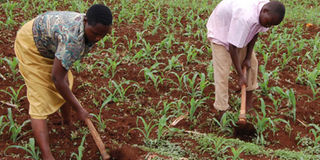WTO Nairobi summit: what’s in for E. Africa?

Farmers tend to their maize garden. Agricultural incentives are expected to be at the forefront of negotiations in the upcoming ministerial conference of the World Trade Organisation in Nairobi. File photo
Kampala- Results of the first World Trade Organisation ministerial conference to be held in Africa are expected to have a huge impact on the Least Developed Countries (LDCs) such as Uganda and the East African Community (EAC) member states in general.
For the 10th time since the WTO came into force, member states will meet in Nairobi, Kenya for the Ministerial Conference from December 15 to 18 to discuss the future of the Doha Round.
The ministerial conference is the top decision making body of the WTO and the Doha Round is the development agenda which was launched in November 2001 in Doha, Qatar, at the WTO’s 4th ministerial conference.
The Doha Declaration focuses on the concerns of the developing countries which rotate around agricultural reforms, particularly reductions in subsidies, issues of non-agricultural market access, special treatment of poor countries and matters of trade facilitation, among others.
Support for farmers
Delivering a keynote address recently in Nairobi to a group of regional civil society organisations, Mr Oduor Ongwen, an economist and analyst on trade and development, said Nairobi is under pressure to deliver the Doha Round yet it died before even the Nairobi meeting was thought about.
He said: “Nairobi should deliver credible outcome that will not favour a farmer in Europe at the expense of a farmer in Africa. We (civil societies) should support our countries as long as they support our farmers, traders and poor people.”
He continued: “Nairobi should not be under pressure because there should rather be no deal than having a bad deal—no deal is better than a bad deal.”
Issues at hand
Mr Ongwen said no matter the outcome of the ministerial conference, the LDCs, among them EAC regional countries, should ensure elimination of agricultural subsidies, particularly on cotton and coffee is blocked.
He also suggested that quota free agricultural products from Africa should be maintained adding that issues that might jeopardise food security, investment and environment, should be rejected.
A deal that will see the LDCs get exploited at the expense of its development should not be allowed. The same lens should be applied to situations that might deprive employment, cause foreign exchange volatilities and discourage transfer of technology.
Speaking at the civil society forum in Nairobi, EAC director for trade Rashid Kibowa said: “With the adoption of trade facilitation, clearance of imports and exports at the custom points will be quickened, a move that is significant in attracting foreign direct investment.”
He added: “Production will only increase where there is efficiency and competition.”
For Africa, the 10th ministerial conference happening at the continent for the first time presents an opportunity for her to direct the outcomes of the WTO negotiations. However, the likelihood of this is still doubtful.
Africa is home to the biggest number of developing countries globally that have been struggling over the past few months to ensure the policy space they have secured at the multilateral level is not lost.
Therefore as the WTO marks 20 years, it is important to evaluate the outcomes of 20 years of Africa’s participation in the multilateral trading system exemplified in the WTO, particularly in defence of their development aspirations.
For Uganda and the EAC, the WTO process is vital in shaping their future global trade engagements with the rest of the world. However, what remains critical is the need to ensure coherence in these negotiations.
The stalemates
After nearly 15 years of negotiations, the Doha Round has witnessed stalemates rising from major differences regarding failure to come up with amicable solutions in agriculture specifically on the issue of a permanent solution on public stockholding for food security and the special safeguard mechanism in agriculture, market access for industrial goods, opening in the services sector especially between developed and developing countries.
The current state of play reflects a major diversion from the original promises of the Doha Round that majorly revolves around agriculture and the expectations of the WTO especially by developing countries.
In recent years, there has been a pronounced demand by developed countries to set aside permanently the entire development mandate of the Doha Round, and to replace it with an alternative agenda so as to introduce the new 21 Century issues.
These new issues also referred to as the “Singapore issues” include investment, transparency in government procurement, intellectual property and competition policy.




